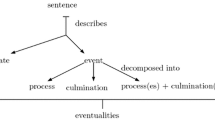Conclusion
Given the failure of Fischer's and other entailment accounts of the soft/hard fact distinction, the conclusion that emerges is that the Ockhamist cannot justify his treating the likes of F1 as soft facts about the past by appealing to an entailment account of soft/hard facthood. As we have seen, accounts of this sort are seriously flawed in that they overlook the point that a fact may entail a fact about the future and still be a genuine past fact. Call this problem ‘the entailment problem’. Even if the Ockhamist can evade this problem by adopting a different account of the soft/hard fact distinction, he is still faced with what Fischer has called the problem of ‘hard-core soft facts’,Footnote 1 i.e. the problem that by having power over facts such as F1, the agent also gets power over hard facts about the past. Although Fischer's way of raising the problem is certainly convincing,Footnote 2 the problem can be raised also in another way by means of the following consideration. Note that (unlike regular soft facts) facts regarding God's forebeliefs of human actions can causally contribute to the occurrence of events preceding those actions. For example, we can conceive of a situation in which God, in the light of his belief that Jones will attempt to murder Smith at T5, reveals this fact to Smith at T3 by causing the occurrence of an event E, e.g. Smith's hearing at T3 a voice telling him about what is going to happen. Now, if God's belief that Jones will attempt to kill Smith were, as the Ockhamist maintains, a soft fact about the past over which Jones has power, Jones could by refraining from his attempt to kill Smith, bring about the non-occurrence of E. This would be a violation PFP.Footnote 3
Both the ‘entailment problem’ and the problem of ‘hard-core soft facts’ pose a serious difficulty for the Ockhamistic approach to the freedom-foreknowledge dilemma. Hence, in the absence of an adequate solution to them, the theological compatibilist would be well-advised to turn to other ways of solving that dilemma.
Similar content being viewed by others
Notes
I am not particularly happy with ‘hard-core soft facts’ since it suggests that God's prior beliefs about human actions are soft facts about the past; whereas in my view, those beliefs should be treated as hard facts about the past.
By saying this, I do not, of course, mean to imply that I accept his solution to the problem.
I develop this consideration at greater length in Widerker (1990: 475–478).
References
Adams, Marilyn (1967). Is the Existence of God a ‘Hard’ Fact, Philosophical Review 76: 492–503. Reprinted in Fischer (1989).
Edwards, Jonathan (1745). Freedom of the Will.
Fischer, John M. (1983). Freedom and Foreknowledge, Philosophical Review 92: 67–79. Reprinted in Fischer (1989).
Fischer, John M. (1985). Ockhamism, Philosophical Review 94: 81–100.
Fischer, John M. (1986). Hard-Type Soft Facts, Philosophical Review 95: 595–601.
Fischer, John M., ed. (1989). God Freedom and Knowledge. Stanford: Stanford University Press.
Fischer, John M. (1991). Snapshot Ockhamism, Philosophical Perspectives 5: 355–371.
Freddoso, A. (1983). Accidental Necessity and Logical Determinism, The Journal of Philosophy 80: 257–78. Reprinted in Fischer (1989).
Hoffman, J. & Rosenkrantz, G. (1984). Hard and Soft Facts, Philosophical Review 93: 419–434. Reprinted in Fischer (1989).
Plantinga, Alvin (1986). On Ockham's Way Out, Faith and Philosophy 3: 235–69. Reprinted in Fischer (1989).
Widerker, David (1989). Two Fallacious Objections to Adams' Soft/hard Fact Distinction, Philosophical Studies 57: 103–107.
Widerker, David (1990). Troubles with Ockhamism, The Journal of Philosophy 87: 462–80.
Zagzebski, Linda (1991). The Dilemma of Freedom and Foreknowledge. Oxford: Oxford University Press.
Author information
Authors and Affiliations
Rights and permissions
About this article
Cite this article
Widerker, D. Contra Snapshot Ockhamism. Int J Philos Relig 39, 95–102 (1996). https://doi.org/10.1007/BF00143688
Issue Date:
DOI: https://doi.org/10.1007/BF00143688



